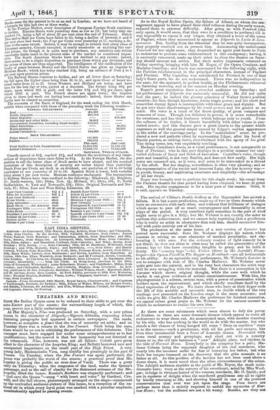The revival of Cibber's Double Gallant at the Haymarket has
proved a failure. It is but a poor production, made up of two or three dramas which have no connexion with each other, and without that brilliancy of dialogue which seems to pass off so much extravagance and immorality in other plays of the period. A very excellent light comedian in the part of Atoll might seem to give it a fillip; but Mr. Webster is not exactly the actor to perform this achievement; and we cannot help regretting that a gentleman who is really an artist in characters that suit him, should encumber him- self with parts entirely out of his line.
The production at the same house of a new version of Lasater has proved more successful. Here Mr. Webster displays his talent, which consists in seizing on some character of marked peculiarity, and ela- borating it with care. For the ordinary routine of light comedy he is not fitted; he does not shine in what may be called the generalities of the drama; but let him have something tangible to grasp, and he holds it firmly. His " country boys "—his Father Oliver in Mr. Jerrold's House- keeper—his Cymon Foxe': in The Beggar on Horseback—are all testimonials to his ability. As an agreeable easy performance, Mr. Webster's Layetter is not to compare with that of Mr. Charles Mathews. Mr. Webster never quite gets into the natural, and in his very best characters the artist may still be seen struggling with the material. But there is a conception in his Lavater which shows original thought, while the care with which he works it out gives evidence of artistic conscientiousness. With him, the physiognomist is a solemn, serious man, with a power of penetration which borders upon the supernatural, and which chiefly manifests itself by the fixed expression of the eye. We leave those who have at their finger-ends the life of this amiable and eccentric man, to decide which of the two readings now presented on the London stage is the more accurate; and while we give Mr. Charles Mathews the preference for finished execution, we cannot refuse great praise to Mr. Webster for the earnest manner in which he endeavours to realize his own idea.


























 Previous page
Previous page